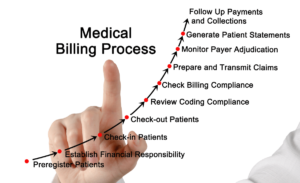Key Takeaways:
- Understand the benefits and challenges of transitioning from in-house to outsourced medical billing.
- Learn the step-by-step process to integrate medical billing outsourcing effectively.
- Discover how to maintain control over your billing operations while leveraging the expertise of outsourced billing companies.
Introduction to Medical Billing Outsourcing
Outsourcing medical billing services can seem like navigating uncharted waters for many healthcare providers. The decision to shift from in-house medical billing to an external billing setup involves several considerations, from cost savings to operational efficiency.
This transition not only promises a streamlined billing process but also enhances revenue cycle management, allowing healthcare facilities to focus more on patient care than administrative tasks.
Why Consider Outsourcing Your Medical Billing?
Many healthcare organizations face challenges with their in-house billing department, including billing errors and high administrative salaries. Outsourcing billing to expert medical billers can reduce overhead expenses and increase revenue.
Moreover, outsourced billing companies often have more sophisticated security protocols to protect patient privacy, ensuring compliance with health regulations.

Evaluating Your Current Billing Efficiency
Before diving into outsourcing, it’s crucial to assess the efficiency of your current billing operations. Look at key metrics such as the rate of claims approved by insurance companies and the time taken to close accounts receivable.
This evaluation will highlight areas needing improvement and help set clear objectives for what you aim to achieve with an external billing provider.
Deciding the Right Time to Outsource
Timing is everything. Transitioning to outsourced medical billing should align with your healthcare practice’s operational calendar and financial planning.
Ideal times include the start of a fiscal year or just after a major system upgrade, such as implementing new electronic health records.
Choosing the Right Medical Billing Company
Selecting the right partner is pivotal. Look for outsourced medical billing companies with a strong track record in your specific healthcare sector, whether it be small medical practices or rural outpatient clinics.
Check their compliance with healthcare regulations and their ability to handle patient data securely.

Planning the Transition
Once you’ve chosen a billing provider, planning the transition is your next step. This involves setting up clear communication channels and timelines. Both parties should agree on the scope of work, from handling patient visits billing to managing insurance company interactions.
Training and Integration
Training your internal staff to work with the new system is essential. The chosen medical billing company should provide comprehensive training on their processes and software. This phase is crucial for maintaining continuity in billing tasks and minimizing disruptions to cash flow.
Monitoring the Outsourcing Impact
After the transition, closely monitor the new system’s impact on your billing operations and financial performance. Key indicators include the timeliness of billing reports and the accuracy of claims processing. Regular audits can help identify any issues early, allowing for timely adjustments.
The Financial Implications of In-House vs. Outsourced Medical Billing
When a medical practice weighs the options between maintaining an in-house billing department and opting to outsource medical billing services, the financial stakes are high.
In-house medical billing requires hiring, training medical billers, and continuous updates on coding regulations, which can be a significant financial burden, especially for small medical centers and private physicians.
These costs include salaries, benefits, and ongoing education for medical billing staff.

On the flip side, outsourcing to third-party companies can appear as a beacon of cost efficiency. By transferring the billing responsibilities to experts, medical practices can eliminate the overhead associated with an in-house team.
Moreover, these specialized companies often have the tools and expertise to reduce billing mistakes and ensure claims are submitted in a timely manner, potentially increasing revenue faster than in-house employees could.
This shift not only cuts down on direct costs but also frees up capital that can be invested back into the core services of the medical office.
Enhancing Patient Satisfaction Through Billing Efficiency
One often overlooked aspect of choosing to outsource medical billing services is the impact it can have on patient satisfaction. An efficient billing process handled by professional coding companies can significantly reduce errors and improve the speed at which claims are processed.
This efficiency leads to quicker resolutions of billing issues, fewer statement call center calls complaining about errors, and a generally smoother financial interaction for patients, which can enhance the overall patient experience.

Conversely, an in-house billing department might struggle with the same consistency, especially if the medical practice lacks the resources to continuously train and update its staff on the latest medical coding changes.
For small medical centers or private practices, where every patient interaction counts, the benefits of outsourcing to a third party company that can handle billing in a professional and timely manner can be a game-changer in maximizing revenue and ensuring patient loyalty.
This strategic move not only supports financial health but also bolsters the practice’s reputation by focusing on patient care without the distraction of financial mishaps.
Maintaining Control Over Outsourced Functions
While outsourcing, it’s vital to maintain oversight of the billing process. Establish regular check-ins with the billing company to review performance against agreed benchmarks.
This ensures that the outsourcing arrangement continues to make financial sense and supports your healthcare facility’s overall goals.
Scaling Operations with Outsourced Billing
As your medical facility grows, your billing needs will evolve. A good outsourcing partner will offer scalable solutions that grow with your practice, from increasing the number of billing staff to expanding the range of billing services offered.

Addressing Challenges in Outsourced Billing
Outsourcing is not without its challenges. Issues such as delays in billing or discrepancies in patient billing can arise. Having a clear conflict resolution strategy and an active management approach can mitigate these risks and ensure smooth billing operations.
Evaluating Long-term Benefits
Over time, outsourcing medical billing should lead to cost savings, improved cash flow, and higher patient satisfaction due to more focused healthcare services. Regularly evaluate these long-term benefits to ensure that the outsourcing decision continues to deliver value.
When to Reassess Your Outsourcing Needs
The healthcare industry is dynamic, and billing needs can change. Regularly reassess your outsourcing arrangements to ensure they still meet your needs effectively. This might mean renegotiating terms or even changing providers if necessary.

Leveraging Technology in Outsourced Billing
Modern billing companies use advanced technology, from artificial intelligence to electronic medical record systems, to ensure accuracy and efficiency. Embrace these technologies to stay at the cutting edge of healthcare billing.
Ensuring Compliance and Security
Compliance with health regulations and ensuring data security are non-negotiable. Ensure your billing partner adheres to the highest standards to protect patient information and comply with healthcare laws.
The Role of Patient Interaction
Outsourcing billing doesn’t mean losing touch with your patients. Ensure that the billing company handles patient communications effectively, maintaining the level of service your patients expect.
Conclusion: Making the Leap to Outsourced Billing
Transitioning to outsourced medical billing is a significant step for any healthcare provider. By following a structured approach and choosing the right partner, you can enhance your billing operations and focus more on providing top-notch healthcare services.
At Reliance Medical Billing Solutions, we work as extension of your office or billing staff to minimize the burden of interpreting insurance policies, determining coverage, and navigating the myriad of changes in payor regulations.
All with the goal of securing accurate and prompt reimbursements, for services rendered, and eliminating unexpected “sticker shock” for patients as it relates to their out-of-pocket medical expense exposure.
Contact us today at 717-740-2622 or email: info@reliancembs.com to discuss how we can assist in increasing the efficiency of your medical billing operations.
At Reliance® – Medical Billing Made Simple®
Frequently Asked Questions (FAQ)
Q1: How does outsourcing medical billing save money? Outsourcing can reduce overhead costs associated with running an in-house billing department, such as salaries, training, and technology upgrades.
Additionally, expert billers can improve the accuracy of billing, reducing delays and denials from health insurance companies.
Q2: How can I ensure the security of patient data with an outsourced provider? Choose a billing provider that follows stringent security protocols and complies with healthcare regulations like HIPAA.
Regular audits and compliance checks can further ensure that patient data is handled securely.
Q3: Can outsourcing medical billing improve patient satisfaction? Yes, by outsourcing billing tasks, healthcare providers can focus more on patient care, potentially improving patient satisfaction.
Additionally, professional billing companies often provide better customer service for billing inquiries, enhancing the overall patient experience.






0 Comments